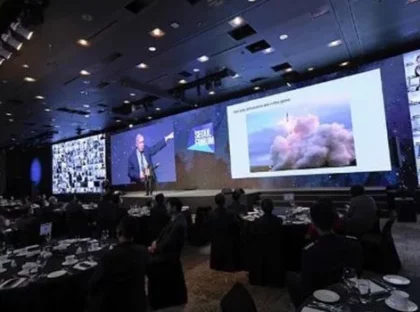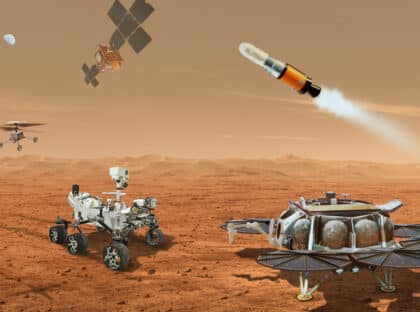
By Dr. Robert Zubrin, The Cosmopolitan Globalist, 07.10.22
The Republic of Korea is a remarkable country. In 1960, seven years after the Korean War ceasefire, it was a corrupt dictatorship with a per capita GDP of US$82, about US$400 in 2022 money—less than Haiti. Today, through incredible drive, it has transformed itself into vibrant modern democracy with a per capita GDP of $30,000, roughly equal to the EU average, and a total GDP greater than Russia’s. This is an absolutely unique achievement, making the ROK the only country that has gone from being a foreign aid recipient to a foreign aid donor. It has also become a cultural superpower, with Korean TV shows, for example, penetrating global media markets to a much greater extent than those of many much larger countries. Its electronics and automotive sectors are top notch, with companies like Samsung and KIA competing aggressively on the global market against Apple and Toyota. It also has a first-rate nuclear industry, capable of building a 1000 MW pressurized water reactor power plant in less than four years (compared to the sixteen-year average now prevailing in the US), making it, alongside France, one of the two free-world nations capable of competing against Russia and China in the global nuclear power export market.
But in recent years, growth has slowed down. As one of his first acts, newly elected conservative president Yoon Suk-yeol reversed the bizarre decision of his left-leaning predecessor to shut down the Korean nuclear industry. But that alone is not enough to restore growth. So, as an additional measure, the government has decided to establish a world class space industry and space program. Its short-term goal is to make the ROK one of the top seven spacefaring nations by 2030 (alongside the China, the EU, India, Japan, Russia, and the US). I was invited to give a talk on why that was necessary, and how it could be done.
I began by focusing on the “New Space” revolution, in which companies like SpaceX have demonstrated that it is possible for a well-led entrepreneurial team to accomplish objectives in one-third the time at one-tenth the cost previously deemed necessary by the traditional government-led space organizations, and even do things they had considered altogether impossible—like making reusable launch vehicles a reality. Accordingly, I advised them to proceed by promoting a dynamic New Space industry in Korea.
I then identified four reasons why they needed to do this: commercial opportunity, military necessity, scientific duty, and obligation to their posterity.
The New Space approach and the first two reasons listed above were music to their ears. The Koreans have been following the progress of the American New Space industry with intense interest, and had already decided to adopt such an approach. You don’t need to explain the concept of commercial opportunity to Koreans. As for military necessity, it was front and center.
The Koreans are very concerned by America’s retreat from its global responsibilities, exemplified by its desertion of Afghanistan and the Biden administration’s inexplicably lethargic response to the Russian invasion of Ukraine. (There are taxicabs in Seoul with Ukrainian flags and the slogan “Stand with Ukraine” emblazoned on them.)1 If the US won’t even supply arms at anything like the rate required for Ukraine to defend itself, would it really be willing to risk the destruction of its Pacific fleet by Chinese land-based missiles to save Taiwan, a nation America does not even officially recognize? If it doesn’t, Japan will certainly rearm, and while Korea and Japan are currently allies, such has not always been the case. Indeed, enmity between the two countries has deep roots, with the horrific Japanese occupation of Korea during the first half of the twentieth century very much a living memory. Russia and China are nearby, too, not to mention the insane, nuclear-armed North Korean regime. Surrounded by such threats, with effective American aid in the event of an attack increasingly uncertain, Korea needs to be able to take care of itself.
As the decisive role of satellite reconnaissance and GPS-guided munitions in the Ukraine conflict has shown, space assets are now central to military power. While it may not be apparent to all, the Ukraine war is actually very much a space war. With the help of American space capabilities, the Ukrainians are currently putting up a stiff fight against much greater Russian ground and sea firepower, for example sinking the Russian Black Sea fleet flagship Moskva with just two precision guided missiles. On the other hand, the denial of American satellite intelligence to Ukraine by the Obama administration allowed its forces to be encircled and defeated in Donetsk in 2014. Facing existential national security risks, Korea cannot leave its safety to the discretion of a changing cast of political players in other countries. It must have a full-spectrum military space program of its own. As I explained this, it was clear that the many senior Korean Air Force officers present were very much onboard and delighted that I was making this case for them to the assembled civilian political and business leaders.
There is no consensus yet among Korean leaders about my other two points, scientific duty and obligation to posterity, so I hit them hard. This is a great age of exploration, I said. Korea needs to be part of it. Great nations do great things. Furthermore, the human push into space could really use an additional strong player with original ideas about places and means to explore. But not only that, even if the national focus is on near-term commercial possibilities and military needs, the way to attract the most talented youth into space technology and related scientific pursuits is by making clear to them that if they educate themselves to do so, they will have an opportunity not just to make a living, but be part of the greatest adventure in human history. The US has benefited enormously this way ever since from the Apollo program, which resulted in a doubling of our scientific and engineering graduates. A bold Korean planetary exploration program could offer similar benefits, not just to their commercial and military space efforts, but to all their technical industries.
The Koreans got this. In fact, some of them have understood it for a while, which is why a Korean lunar orbiter will be launched to the Moon by a SpaceX Falcon 9 this August. But spacecraft are largely electronics systems, and there is no reason why Korea, with its first-rate electronics industry, could not be producing Mars orbiters and other solar system exploration spacecraft alongside its commercial and defense satellites, thereby making a powerful contribution to science while promoting in the clearest way possible the quality of its brand. I think this struck home.
As for my final point, that we are living at the beginning of history, the time when humanity first set sail for other worlds, and the nations who take part in that will be those who put their stamp upon the future—I’m not sure if they all got it. But they will. Because knowing what I know about Koreans, I believe that in twenty years they will probably not just be one of the top seven spacefaring nations, but one of the top two.


